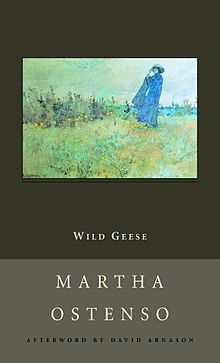- Martha Ostenso
-
Martha Ostenso (17 September 1900 - 24 November 1963) was a Canadian novelist and screenwriter.
Contents
Background
Ostenso was born in Haukeland (now part of Bergen), in Hordaland County, Norway. Her parents were Sigurd and Olina (née Tungeland) Ostenso. She emigrated with her family to the United States in 1902. They first settled in South Dakota and Minnesota before immigrating to Canada in the province of Manitoba. Ostenso taught in a rural school and was educated at the University of Manitoba.[1]
Biography
Ostenso is probably best known for the award-winning novel Wild Geese, published in 1925. Hailed by critics as a landmark in Canadian realism, the novel is a story about a young schoolteacher sent to teach in rural Manitoba. Wild Geese won the 1925 Dodd, Mead and Company Best Novel of the Year Award and brought her much popular and critical attention. It made her a well-known and best-selling author.[2]. The novel was filmed as Ruf der Wildgänse in 1961 as a West-German and Austrian co-production and as After the Harvest in 2001 for Canadian TV.
Ostenso continued to publish short stories, novels and wrote a number of screenplays. Although it is now known that Ostenso collaborated with her husband, fellow novelist Douglas Durkin, all her writing appeared under her name alone. Ostenso produced fifteen more novels, the most successful of which was O River, Remember, a novel about a family in the Red River Valley of Minnesota which won a Literary Guild selection in 1943.[2]
Many of her novels were based on Minnesota farm life; most incorporate elements of romance and melodrama. Ostenso portrays the lives of rural immigrants with dignity. Although none of her later novels ever reached the acclaim Wild Geese attracted, most continued to explore a similar theme: the relationship between men and women and the land they work. A number of her other works were translated and have been reprinted several times.[2]
Asked how to pronounce her name, she told The Literary Digest, "Of the three syllables in Ostenso, the first receives the major accent, the second is without accent, the third receives a minor accent. The final result is as if you spoke the name Austin and added so as an afterthought... Since I was born in Norway, I suppose I should insist on the Norwegian values. But I don't. I am even weary of correcting people who insist that it is Ostenso. However, the Norwegians say Östensö... The accent is the same, so perhaps I am not too pedantic in maintaining that accent, since I have to sacrifice the vowel character." [3]
Selected bibliography
- In a Far Land (1924)
- Wild Geese (1925)
- The Dark Dawn (1926)
- The Mad Carews (1927)
- The Young May Moon (1929)
- The Waters under the Earth (1930)
- Prologue to Love (1931)
- There's Always Another Year (1933)
- The White Reef (1934)
- The Stone Field (1937)
- The Mandrake Root (1938)
- Love Passed This Way (1942)
- And They Shall Walk (1943, with Sister Elizabeth Kenny)
- O River, Remember! (1943)
- Milk Route (1948)
- The Sunset Tree (1949)
- A Man Had Tall Sons (1958)
References
- ^ Encyclopedia of Literature in Canada. Edited by W. H. New. Toronto: University of Toronto Press. p.854-55. ISBN 0-8020-0761-9
- ^ a b c Buckley, Joan N. “Martha Ostenso: Norwegian-American Immigrant Novelist” (NAHA. Volume 28: Page 69
- ^ Charles Earle Funk, What's the Name, Please?, Funk & Wagnalls, 1936
Further reading
Hammill, Faye (2008). "Martha Ostenso, Literary History, and the Scandinavian Diaspora". Canadian Literature 196 (Spring): 17–31, 202.
External links
Categories:- 1900 births
- 1963 deaths
- People from Bergen
- Canadian novelists
- Canadian screenwriters
- Women screenwriters
- Canadian people of Norwegian descent
- American people of Norwegian descent
- Norwegian emigrants to the United States
Wikimedia Foundation. 2010.

